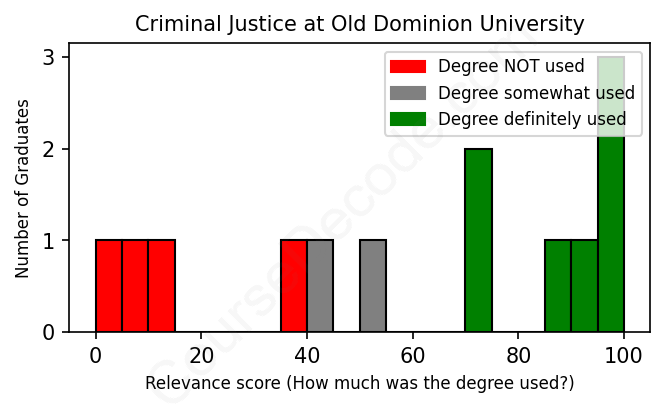
First, some facts. Of the Criminal Justice graduates from Old Dominion University we've analyzed , here's how many have used (or NOT used) their degree in their career:

These are estimates based on AI analysis of 13 LinkedIn profiles (see below).
The verdict? Below average. Overall, with an average relevance score of 59%, Criminal Justice graduates from Old Dominion University have a lower likelihood (-8%) of finding work in this field compared to the average graduate across all fields:
And for comparison, here's the chart for all profiles we've looked at across all degrees.
Also, after graduating, only 30% of these graduates have pursued further education other than another Bachelor's degree (such as a Masters degree or other), compared to the average across all profiles of 35%. This suggests a Bachelors degree is enough for most Criminal Justice graduates, and it's normal to look for work straight after graduation.
See the details:
|
Relevance score: 37% We think this person has NOT gone into a career related to their degree. We think this person has NOT gone into a career related to their degree.
DEGREE INFOGraduated in 2013 from Old Dominion University with a Bachelor of Science (BS) in Criminal Justice. No other secondary education since. JOB HISTORY SINCE GRADUATIONPublic Policy Associate Cavarocchi, Ruscio, Dennis Associates Oct 2013 - Jan 2014 Membership Representative  American Sociological Association Jun 2014 - Jun 2016 Program Assistant, Minority Fellowship Program  American Sociological Association Jun 2016 - Nov 2017 Outreach and Marketing Specialist, Fellowships Office  The National Academies of Sciences, Engineering, and Medicine Nov 2017 - Oct 2019 Outreach and Marketing Associate, Fellowships Office  The National Academies of Sciences, Engineering, and Medicine Oct 2019 - Jan 2021 Associate Program Officer, Marketing Specialist  The National Academies of Sciences, Engineering, and Medicine Jun 2020 - Nov 2021 Community Outreach and Enrollment Manager  For Love of Children Jul 2022 - Feb 2023 Enrichment Coordinator  FLEX Academies Aug 2023 - Present ABOUT[NAME REMOVED] is a dedicated and impassioned marketing professional driven by a profound commitment to enhancing the quality of life for underserved communities and at-risk youth and young adults.His achievements include, but are not limited to: Spearheaded the vision and strategy for over 15 outreach and social media campaigns for a minority fellowship research funding program. Implemented strategies leading to an outstanding 85% increase in qualified application submissions from diverse STEM candidates. Skillfully negotiating procurements, resulting in a substantial reduction of expenses by over $19,000 in fellowship program advertising. Cultivated engagement with a robust network of more than 3000 alumni, seamlessly integrating them into program promotion initiatives. Collaborated cross-departmental and with external stakeholders to champion diversity within the National Academies' activities.[NAME REMOVED]'s unwavering dedication and proven track record make him an invaluable asset in any professional setting. |
The top 10 most common jobs done by the graduates we've analyzed (ranked most common to least) are:
When looking at the career paths of those who graduated with a Criminal Justice degree from Old Dominion University, it's clear that many have pursued jobs closely related to the field. A significant number ended up in roles that deal directly with the justice system, including positions like legal interns, victim advocates, and probation officers. These jobs typically make use of the knowledge and skills acquired in their studies, particularly in understanding legal principles, victim rights, and operational protocols within the justice system. It’s not just about being in a courtroom, either; many graduates have taken on roles in security and risk management, where their background helps them navigate safety protocols and compliance regulations. Such positions are definitely relevant and exhibit how the degree can apply in various ways.
However, there are also quite a few graduates who ended up in jobs that aren't directly tied to criminal justice. For example, some took roles in mortgage companies or IT support, which don't necessitate any criminal justice knowledge. Even within the realm of law enforcement and security, some positions leaned more toward management and administrative tasks that don't directly engage the core aspects of criminal justice. So, while many graduates utilize their education effectively in justice-related roles, there is a notable portion that veers off into other industries, reflecting a broader scope of career possibilities beyond the traditional justice sector.
Here is a visual representation of the most common words in job titles for Criminal Justice graduates (this is across all Criminal Justice graduates we've analyzed, not just those who went to Old Dominion University):

Graduates from the Criminal Justice program at Old Dominion University seem to have had a diverse range of career trajectories, with many individuals securing roles that are at least somewhat aligned with their degrees, especially in the first few years after graduation. Common initial jobs include positions in law firms such as paralegal roles, as well as entry-level roles in security and law enforcement. Over time, it becomes evident that while some graduate paths remain connected to criminal justice—such as those who take on roles as victim advocates or probation officers—others transition into entirely different fields, often moving into corporate roles or management positions in industries like mortgage lending and marketing. This indicates that the skills learned during their studies in Criminal Justice may lend themselves to various career options.
Looking 5 to 10 years out, it’s clear that some graduates have advanced significantly within their careers, often in specialized positions like security officers or consultants for firms like Booz Allen Hamilton, showcasing a potential trend of graduates staying in roles that leverage their educational background while climbing the professional ladder. Conversely, others have moved towards roles that seem less connected to their field at all, transitioning into areas like public policy, marketing, or even technical support. While some alumni certainly find meaningful and relevant careers in criminal justice-related fields, others may pursue opportunities that aren't as closely linked, suggesting a mixed bag of outcomes for those entering the workforce. Overall, there's a potential spectrum of success, and while some are thriving in positions that use their degree directly, others have ventured far from those initial career tracks.
Honestly, getting a Bachelor’s degree in Criminal Justice, whether at Old Dominion University or any other school, falls somewhere in the moderate range in terms of difficulty. It’s not crazy hard, but it does require commitment and a decent amount of reading, writing, and critical thinking. You'll dive into topics like criminology, law enforcement, and the legal system, which can be pretty interesting if you're into that stuff, but it’s not just a walk in the park. Some classes might challenge you, especially if you’re not used to research or writing papers. Overall, if you put in the effort and stay organized, you'll probably find it manageable and even enjoyable!
Most commonly, in the LinkedIn profiles we've looked at, it takes people 4 years to finish a Bachelor degree in Criminal Justice.
Looking at these Criminal Justice grads from Old Dominion University, it seems like there’s a pretty mixed bag when it comes to how much money they’re making. Some of them climbed the ladder in secure research and project management roles at ODU, which likely pays decently, especially at the director and assistant VP levels. Meanwhile, others have taken roles like paralegal and victim advocate, which can start off on the lower end but might grow with experience. On the other hand, a couple of grads found themselves in consulting and management at places like Booz Allen Hamilton and Target, where salaries tend to be more competitive. Overall, it looks like some of these folks are doing pretty well, especially those in management and security roles, while others might be still working their way up.
Here is a visual representation of the most common words seen in the "about" section of LinkedIn profiles who have a Bachelor degree in Criminal Justice (this is across all Criminal Justice graduates we've analyzed, not just those who went to Old Dominion University). This may or may not be useful:

Here are all colleges offering a Bachelor degree in Criminal Justice (ordered by the average relevance score of their Criminal Justice graduates, best to worst) where we have analyzed at least 10 of their graduates: